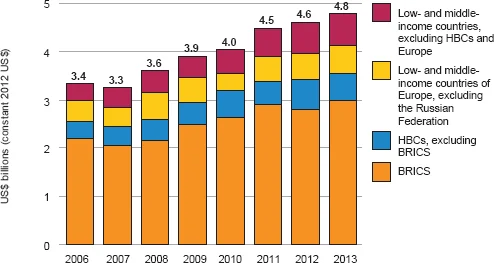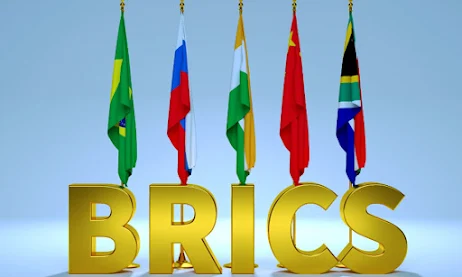Introduction
In a significant development on the global stage, the BRICS group — comprising Brazil, Russia, India, China, and South Africa — announced its expansion to include six new members: Argentina, Egypt, Ethiopia, Iran, Saudi Arabia, and the United Arab Emirates (UAE). This move marks a strategic shift in international relations and economic cooperation, as the expanded BRICS group aims to create a more balanced global order and reduce the dominance of Western institutions such as the International Monetary Fund (IMF) and the World Bank.
What is BRICS?
BRICS is an acronym for five leading emerging economies: Brazil, Russia, India, China, and South Africa. The group was originally formed in 2009 (South Africa joined in 2010) with the goal of fostering economic cooperation, political dialogue, and multilateralism among its members. Together, BRICS countries represent over 40% of the world’s population and account for approximately 25% of global GDP.
The significance of BRICS lies in its members' vast resources, diverse economies, and geopolitical influence. The group has become a powerful voice in advocating for the interests of developing countries, challenging the hegemony of traditional Western powers.
 |
| 360 Blogs |
The Expansion: New Members and Their Implications
The recent announcement to expand BRICS to include Argentina, Egypt, Ethiopia, Iran, Saudi Arabia, and the UAE is a major step towards reshaping the global political and economic landscape. Here’s a closer look at the new members and what they bring to the table:
Argentina: As the third-largest economy in Latin America, Argentina’s inclusion strengthens BRICS’ influence in the Western Hemisphere. Despite its economic challenges, Argentina has vast natural resources, including lithium and shale oil, which are crucial for the global energy market.
Egypt: Egypt, with its strategic location as a gateway between Africa and the Middle East, brings significant geopolitical value. As a major player in the Arab world, Egypt’s inclusion enhances BRICS' influence in Middle Eastern affairs.
Ethiopia: As Africa’s second-most populous country and one of the fastest-growing economies on the continent, Ethiopia’s inclusion in BRICS highlights the group’s focus on fostering development in Africa. Ethiopia’s strategic location in the Horn of Africa also provides a critical geopolitical advantage.
Iran: Iran’s membership is particularly noteworthy due to its substantial oil and gas reserves and its strategic location at the crossroads of Central Asia, the Middle East, and South Asia. Iran's inclusion may be seen as a move to counter Western sanctions and reduce reliance on the US dollar.
Saudi Arabia: As the world’s largest oil exporter, Saudi Arabia’s inclusion in BRICS significantly enhances the group’s energy capabilities. Saudi Arabia's membership also signals a shift in its foreign policy towards greater alignment with emerging economies.
United Arab Emirates (UAE): The UAE, a major financial hub in the Middle East, brings significant economic and strategic value to BRICS. Its inclusion highlights the importance of economic diversification and innovation within the group.
 |
| 360 Blogs |
Strategic Implications of the Expansion
The expansion of BRICS is a clear indication of the group's ambition to create a multipolar world order. Here are some strategic implications of this development:
Economic Diversification and Strengthening Trade Ties: The expanded BRICS group encompasses a wide range of economies with diverse strengths, from energy resources to technological innovation. This diversity provides opportunities for increased trade and investment among member countries, reducing dependence on Western markets.
Geopolitical Realignment: The inclusion of new members, particularly from the Middle East and Africa, is likely to shift the geopolitical balance. BRICS is positioning itself as a counterweight to Western influence, particularly the United States and the European Union. This move could lead to new alliances and partnerships that challenge existing geopolitical norms.
De-Dollarization Efforts: One of the primary objectives of the expanded BRICS group is to reduce reliance on the US dollar for international trade. By promoting alternative currencies, the group aims to create a more balanced global financial system and reduce the dominance of the dollar.
Challenges to Western Dominance: The expansion of BRICS is seen as a direct challenge to Western-led institutions like the IMF and the World Bank. The group has already announced plans to establish a new development bank to provide financial assistance to member countries and reduce dependence on Western financial institutions.
Enhanced Focus on Sustainable Development: With the inclusion of countries from diverse economic backgrounds, the expanded BRICS group is likely to prioritize sustainable development goals (SDGs). This focus aligns with global efforts to address climate change, poverty, and inequality.
 |
| 360 Blogs |
Challenges Ahead
While the expansion of BRICS presents numerous opportunities, it also faces several challenges:
Diverse Economic Interests: The new members have different economic priorities and levels of development. Aligning these diverse interests to create a cohesive strategy will be a significant challenge for BRICS.
Geopolitical Tensions: Some of the new members, such as Iran and Saudi Arabia, have a history of geopolitical rivalry. Managing these tensions within the BRICS framework will require diplomatic finesse and a focus on common goals.
Integration and Cohesion: Expanding the group from five to eleven members requires significant changes in its organizational structure and decision-making processes. Ensuring smooth integration and maintaining cohesion among members will be crucial for the success of the expanded BRICS group.
Global Perception: The expanded BRICS group may be perceived as an anti-Western alliance, which could lead to increased tensions with Western powers. Balancing its objectives with global cooperation will be essential for maintaining a positive global image.
 |
| 360 Blogs |
Conclusion
The expansion of BRICS to include Argentina, Egypt, Ethiopia, Iran, Saudi Arabia, and the UAE marks a significant shift in the global political and economic landscape. The group’s ambition to create a multipolar world order, reduce reliance on the US dollar, and promote sustainable development presents both opportunities and challenges. As BRICS continues to evolve, its ability to navigate these challenges and leverage its diverse strengths will determine its role in shaping the future of global politics.
The world is watching closely as BRICS, now expanded and more diverse, takes center stage in the quest for a more balanced and inclusive international order.
This blog covers the latest international news and provides a comprehensive analysis of the BRICS expansion and its global implications.


0 Comments